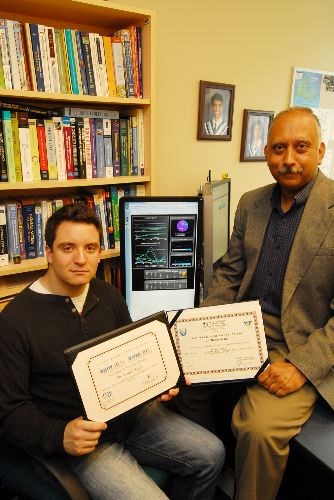A University of Northern British Columbia professor and one of his students recently won major awards for their work at two separate international conferences.
Computer science professor Waqar Haque and fourth-year undergraduate Jake Edwards won the best research paper award out of submissions from 22 participating countries at an International Conference on Information and Communication Systems in Jordan.
Haque and Edwards then went on to win another award for best research paper at the Business Intelligence and Data Warehousing Conference in Singapore last month.
"It was a fantastic experience for me. I really appreciated the chance to work with Dr. Haque on these papers" said Edwards.
"It's an opportunity I probably wouldn't have had at a larger institution. I may not have even learned that this type of research is something I enjoy, which it certainly is."
Both papers concern methods of analyzing raw data from unconventional sources to achieve business objectives.
"Business data is traditionally collected by units such as finance, marketing, or sales that have an eye for the type of analytics they need and collect the appropriate information," said Haque, a professor in UNBC's business school.
"In our study, we decided to apply business intelligence concepts to data that had been collected, but not for strategic business use. It tends to be of poor quality for the purposes of managerial decision making because it is not collected with advanced analytics in mind."
To illustrate, Haque and Edwards took information compiled over 19 years for a silviculture study and used methods and tools they developed to convert data from 270 tables into information that could be used for making business decisions.
"Basically, if you look at the information being recorded by any business, such as the transaction history in a bank account or at a retail outlet, it's all raw data," said Edwards.
"A specific business objective may not have been in mind when the data was compiled, but the raw data can still be analyzed and transformed into information which can be used to answer business questions related to spending patterns, targeted marketing objectives, or any other point of interest."
Edwards added that now that he has had a taste of the world of research, he plans on pursuing a master's degree. Another UNBC computer science grad, Derek Belsham, also co-authored one of the papers.



